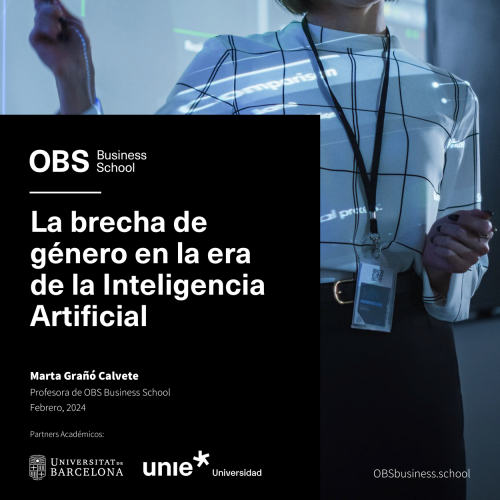
OBS Report: The gender gap in the age of Artificial Intelligence
Europe will need 67 years to close the gender gap
- It will take 131 years to reach parity in the world.
- The most advanced countries in achieving parity are Iceland, Norway and Finland. Spain is number 18 right behind New Zealand.
- Equal gender representation in the development and application of AI becomes essential to avoid bias. Women can bring not only technical skills, but also unique perspectives.
- Inclusive education from an early age, awareness campaigns and mentoring programmes are some of the proposals to achieve this, according to this report.
February 2024. OBS Business School publishes its Gender Gap in the Age of Artificial Intelligence Report, led by Professor Marta Grañó.
The Global Gender Gap Index (GGGI) produced by the World Economic Forum has closed in 2023 at 68.4%. This represents an improvement over the previous year of 0.3%, and 4.1% over 2006, when this index was born. Although the evolution has been positive, progress is slow. In fact, at the current rate, it will take 131 years to reach parity in the world. If we analyse the data by region, we can see that Latin America and the Caribbean is the region that needs the fewest years to reach parity if it maintains its current pace (53 years), while Europe would need 67 years to reach it and the East Asia and Pacific region would need 189 years. The most advanced countries in this area are Iceland, with a rate of 91.2 per cent, Norway (87.9 per cent) and Finland (86.3 per cent). Spain is at 79.1% and ranks 18 behind New Zealand (85.8%). At the other extreme are Afghanistan (40.5%), Chad (57.0%) and Algeria (57.3%).
The obstacle of "Greedy work"
One of the reasons that this gap continues to exist, despite progress, is the over-representation of women in low-wage sectors. The concept of "greedy work", coined by Dr. Claudia Goldin, describes a work reality where certain jobs demand an inordinate investment of time and energy from their employees. These jobs, often highly paid and prestigious, require almost total availability, long working hours and dedication beyond what would be considered a standard working day. In some sectors, greedy work has become the norm, leading to a work culture in which a willingness to sacrifice personal and family time for professional success is valued and expected. For women in particular, greedy work represents a significant obstacle in their career paths. The report therefore considers it important to decouple high pay from long working hours, and proposes that productivity and results be valued more highly, as this approach would allow women, who often take on greater family responsibilities, to maintain a healthier work-life balance without sacrificing their career development or earning potential.
How this gap affects the creation of Artificial Intelligence systems
In this context, where Artificial Intelligence (AI) is having a transformative impact on almost every aspect of life and work, the gender gap becomes critically relevant. As this technology advances, equal gender representation in its development and application becomes essential to avoid bias and ensure that AI systems are fair and effective for all. A pronounced gender gap in this field can lead to the creation of AI systems that perpetuate gender stereotypes and discrimination, affecting everything from hiring decisions to medical diagnoses and consumer preferences.
During the 1980s and 1990s, AI experienced significant growth with the development of machine learning algorithms and neural networks. It was then that women began to have a greater presence in the field, with pioneers such as Elaine Rich, author of one of the first textbooks on AI, and Cynthia Breazeal, known for her work in social robotics. The last decade has seen unprecedented advances in the field, driven in large part by the rise of Deep Learning and Big Data, and women have begun to take on more prominent roles. Figures such as Fei-Fei Li, co-creator of ImageNet (a massive dataset that drove advances in computer vision), and Joy Buolamwini, founder of the Algorithmic Justice League, which advocates for the ethical use of AI, are examples of women's major contributions to the field. However, despite this, the field of AI - as in most technological fields - remains predominantly male. Gender bias in AI algorithms and systems is therefore a significant and growing problem. The OBS report further states that women can bring not only technical skills to AI, but also unique perspectives that are crucial to the development of equitable and ethical technologies. But addressing these biases requires a conscious and coordinated effort on several fronts, the report says, from data collection to technology development and implementation.
Fostering female talent in AI
The OBS Business School report suggests three lines of work: inclusive education from an early age to encourage more girls to enter the STEM field, awareness-raising and outreach campaigns to highlight the achievements and contributions of women in AI, and establishing mentoring programmes that connect young women with successful professionals in this field. "Combining these types of initiatives with a cultural change and giving greater visibility to women in prominent roles is fundamental," says Marta Grañó, who also talks about establishing specific scholarships for young women interested in Artificial Intelligence.
Fostering female talent in AI is crucial to ensure diversity and inclusion in the design and development of future technologies. Educational initiatives and training programmes should be designed not only to teach technical skills, but also to raise awareness of the importance of gender equity in technology. These initiatives should start in early education and extend to university and professional levels. "In the face of the differences that persist, we need to show the relevant statistical and scientific information, to convey the reality so that society is aware that there is still a long way to go. Because people may have different opinions, but we cannot have different data", concludes Grañó.
Content written by
Carmen García-Trevijano
OBS Business School Press Office

